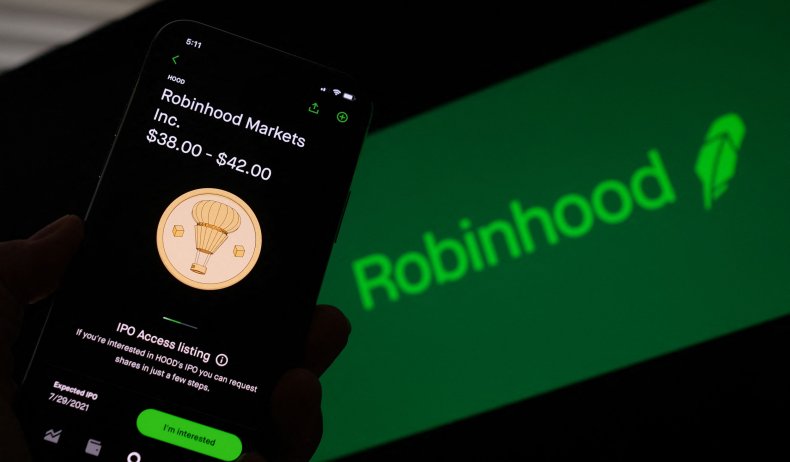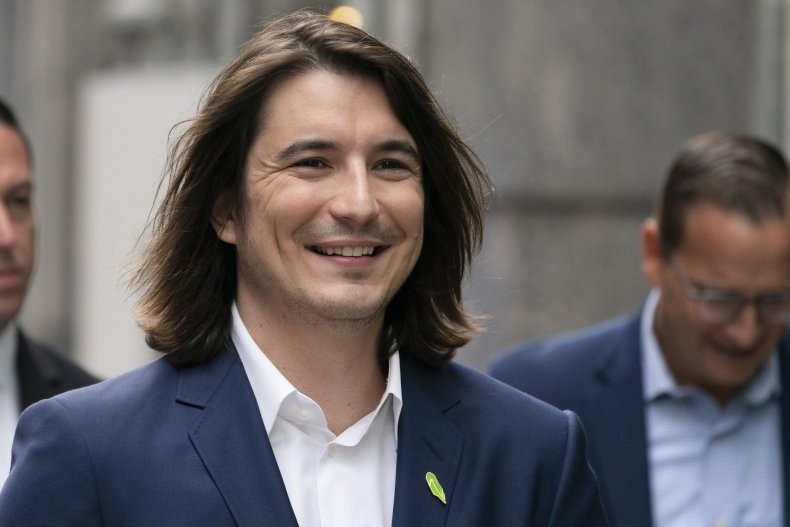Robinhood Sees Steep Drop of 12.2 Percent on First Day of Trading, Then Rebounds
The brokerage app Robinhood entered the stock market Thursday and saw a steep drop of 12.2 percent on its first day of trading but then rebounded, the Associated Press reported.
Robinhood Markets debuted with an initial price of $38. In its first hour of trading, it jumped 5.9 percent and then sharply fell by 12.2 percent. Since the drop, it rebounded by the afternoon with its price hitting $36.22 at 2 p.m. Eastern Time. The popular trading app's stock has not yet reached its initial price at the time of writing.
"I expected a pop," Robinhood user Jeffrey Colindres-Soto, 26, told the AP. "But once it started dipping the way it did, I think a lot of people just started to leave because they already knew that was the selloff right there."
Robinhood is currently valued at around $30 billion after its establishment in 2013 as a commission-free stock trading app.
For more reporting from the Associated Press, see below.

Robinhood helped reshape the stock market by bringing millions of new investors to Wall Street, and its initial reception was wild.
Perhaps fitting for a company that upended the investing business, its stock made jagged moves. By 2 p.m. Eastern Time, Robinhood Markets was down 4.7 percent from its initial price of $38 set late Wednesday.
It's a relatively disappointing opening for the highly anticipated offering, which had already priced at the low end of its expected range. The stock could see continued sharp swings through the day given Robinhood's unusual move to reserve a big chunk of shares for its own smaller-pocketed customers rather than big professional firms.
The company's current price puts it on par with companies like Kroger and Old Dominion Freight Line, but its heft on the pop-culture landscape may be even weightier. Robinhood has created plenty of passion, both by users and critics alike.
The company has grown explosively since its 2013 founding, with an estimated 22.5 million funded accounts, after it did away with trading fees and made investing easier and even fun to do with its mobile app. More than half its customers are first-time investors, giving them more ability to keep up with the stock-holding, wealthier households that had been pulling away for years.
But Robinhood has also drawn heaps of criticism from some of its users as well as regulators, with a lengthening list of regulatory settlements. Critics say Robinhood encourages unsophisticated investors to make trades too often that may be too risky.
Some users, meanwhile, are still angry at Robinhood after it and other brokers temporarily locked them out of trading GameStop shares earlier this year, when hordes of smaller-pocketed investors were pushing the stock up in part to spite the monied elite on Wall Street.
Now that Robinhood's stock is trading on the Nasdaq, its performance gives a real-time look at the market's judgment of the company's prospects. The company is already delivering the strong growth that Wall Street is always hungry for: Revenue soared 245 percent last year to $959 million.
But questions remain about whether regulators may tighten oversight of its main money maker. That's routing its customers' orders to big Wall Street trading firms, which pay Robinhood to take the other side of the trade.
Beyond that, Robinhood stands to lose if the boom in trading it's helped create among regular people, rather than just professional firms, fades. That could come if its oftentimes younger customers go back to doing other things than trading on their phones as the pandemic hopefully eases, or if users leave for competitors.
Such worries may have dragged Robinhood's stock down in its early trading, a notable move when stocks traditionally get a pop in their first day.
The initial pricing for the stock and its early fall were discouraging signs for Sandra Marvel, a 49-year-old investor from Raymore, Missouri, who had been planning on buying shares.
"I completely abandoned my plan," she said. "It doesn't look good. I think there are a lot better trades out there."
Marvel, who left her job in insurance sales last year to trade stocks full time, has been using Robinhood since 2018.
Colindres-Soto from Miami, was a Robinhood user who did buy the stock, 20 shares for $33.85 apiece. But it may not be long before he sells it.
"If it gets to $38, I make my profit, and that's it," he said. If it goes the other way, the valet-parking supervisor plans to dump the stock before it goes below $35.50.
Companies typically see a big jump on the first day of their stock trades. So far this year, a busy one for IPOs, the average debut has returned 34 percent on day one from its offer price, according to Renaissance Capital. But with so much interest in the stock among smaller-pocketed investors, experts said the stock was likely to be more volatile. Such investors have the reputation of selling their shares more quickly than big professional investors.
Robinhood has big plans for growth in the future, continuing its evolution since launching as a stock trading app only for iPhones.
"Over time, we want to be the single money app, the most trusted and most culturally relevant money app worldwide," CEO Vlad Tenev said in an interview. "So, everything that you use your money for, you should be able to do through Robinhood."
Among them, he said, were direct deposits of paychecks and paying bills online.
He also pushed back on criticism that Robinhood is making the stock market a casino by encouraging its customers to trade more often.
"I think it's a big, big mischaracterization because if you look at it, the stock market has been one of the greatest wealth creation tools," he said. "We should be encouraging access to it and not denigrating people that are able to use it. So in a sense, you're hearing when wealthier customers are engaging in the stock market, it's investing. But when the rest of us are accessing the stock market, it's gambling."
Robinhood itself raised nearly $1.9 billion in the deal, which it plans to use to expand and to help pay for expected tax obligations.


